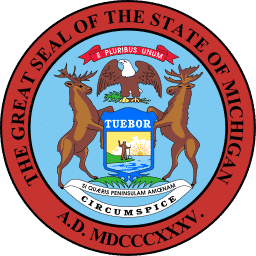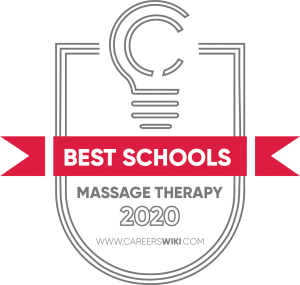…
There are 13 massage therapy schools in Michigan. They range from privately owned institutes to public colleges. Some teach only massage and others have programs in a variety of fields.
Most of the schools offer MT certificate (also called diploma) programs, which take a year or less to complete. Some institutions award associate degrees, and one university presents bachelor’s degrees. Students attend classroom lectures, get hands-on training in labs, and gain real-world experience in clinics.
The popularity of massage therapy in the Wolverine State is soaring, with experts forecasting 520 new positions for practitioners annually until at least 2026.
View best schools in all other states here.

A division of the state Department of Licensing and Regulatory Affairs (LRA), this panel “promotes and protects the public’s health, safety, and welfare.”
The board establishes standards for massage therapists concerning education, examinations, and other considerations. It determines whether a license applicant is eligible to practice in Michigan, and ensures that therapists renew their licenses and receive continuing education.
Another responsibility is to approve schools with curricula that comply with certain criteria. The board also investigates complaints, taking disciplinary action against licensees who violate laws, regulations, or ethics. The 11 voting board members include seven massage therapists and four public representatives.
The LRA’s Bureau of Corporations, Securities and Commercial Licensing issues licenses to massage therapy schools. A list is posted online.
To become a massage therapist in Michigan, the process begins by graduating from high school or securing a GED. Science and health classes might be helpful in winning admission to an MT school.
To earn state board approval, a postsecondary institution has to provide a certificate or degree program with 625 or more clock hours of instruction and training. This must include:
The rest of the schools’ curricula are often not the same. Some programs train students in many massage modalities, while others exceed the required number of hours in clinical settings. Students need to find out which institution best satisfies their interests and career goals.
To qualify for state licensure, graduates must contact the Federation of State Massage Therapy Boards to sign up for the Massage and Bodywork Licensing Examination. The test, known as the MBLEx, is administered at Pearson VUE assessment centers. There is a fee of about $200 to take the computer-based exam, which is available in English and Spanish.
Every three years, Michigan practitioners are required to obtain license renewals. They must earn 18 continuing education credits from board-approved providers.
We selected the schools below based on the programs that they offer, accreditation, student population, graduation rate and reputation.
View our Ranking Methodology to learn more about how we rank schools.

NA
24
This school in downtown Port Huron offers a 10-month diploma program that the Commission on Massage Therapy Accreditation has approved.
The 750-clock-hour curriculum emphasizes a “holistic approach, personal growth, and self care.” Students may take some courses online. They attend workshops of their choosing at least six times per year, and give massages in an on-campus clinic three or four times a month.
Tuition includes a massage table package and starter kit, as well as the licensing exam fee. The school also pays for student membership in a professional organization that provides liability insurance.
29%
157
A career training institute for more than 80 years, DBS awards massage therapy certificates on its main campus in Madison Heights.
The curriculum, which totals 900 clock hours, features training in Swedish, deep tissue, chair, and sports massage. There are also classes teaching Eastern modalities, spa applications, and neuromuscular therapy. The program takes about nine months to complete. Day, afternoon, and evening class schedules are available.
A student clinic serves real clients in the evenings and on Saturdays. Career services include resume writing assistance, interviewing techniques, job-search guidance, and employment opportunities.
82%
125
This private school traces its history to the 1940s. There are four campuses, including one in Bay CIty with a massage therapy certificate program.
The curriculum involves 700 clock hours. A 405-hour course covers body mechanics, Swedish massage, Shiatsu, pregnancy massage, seated or chair massage, polarity therapy, muscle isolation, reflexology, sports massage, infant massage, acupressure, trigger point massage, and myofascial release. Students also learn hot stone and prenatal massage, and lymphatic drainage.
The program lasts seven months for full-time students. Some attend classes part time. Participants administer traditional and hot stone massages at the school’s salon and spa.
93%
134
Founded in 1947, the CI School of Allied Health Technology is a for-profit operation in Troy. It offers 11 medical career-training programs.
The 57-credit-hour massage therapy certificate curriculum takes 12 months of full-time study to finish. The program “emphasizes the correct application of body mechanics by both client and practitioner, the correct use of massage therapy equipment, and the creation of a safe therapeutic massage environment.” Classes start in September, January, March, and June.
The school pays for student membership in the American Massage Therapy Association and the Associated Bodywork & Massage Therapy Association.
61%
324
Massage therapy is the only program at this private Southfield school, which also provides community education classes. Students can earn certificates in less than a year. Myomassology is a holistic approach that balances the body, mind, and spirit.
In addition to the courses that the state requires, students take Client Evaluation, Communications, CPR, Muscle Mechanics, Swedish Massage, Myofascial Release, Deep Tissue Massage, Reflexology, Cranial Massage, Lymphatic Drainage, Face Massage, and Professional Development.
Electives are Therapeutic Bodywork, Eastern Practices, Personal Development, Complementary Healing, and Energy Work. Students get experience in a clinic and at community outreach events.
65%
793
Owned by a company that sells beauty products, this school offers four certificate programs in six locations. Massage therapy students are found on campuses in East Lansing and Ann Arbor.
The 625-clock-hour program is based on Ayurvedic massage technique. Along with the mandated curriculum, there is instruction in aromaology, spa treatments, and body movement techniques. Students may attend classes during the day or in the evening.
Aveda, which operates salons and spas, prides itself on its business training. Students learn how to start their own practices. They also receive job-placement assistance and meet potential employers at career fairs.
25%
3541
This public school in downtown Port Huron, known as SC4, awards certificates and degrees in about three dozen fields. Among the programs is an associate in applied science degree in massage therapy.
The 65 credit hour curriculum includes classes in microcomputer applications, English composition, political science, sociology, business math, and psychology. A student may transfer 32 credits from the certificate program at Lakewood School of Therapeutic Massage to the AAS program.
Classes are small, with only two to four students completing the program in recent years.
43%
2433
A Catholic institution in Adrian, SHU offers a Bachelor of Applied Science (BAS) degree. The program is designed for professionals with certification from the National Certification Board for Therapeutic Massage & Bodywork.
This is an “inverted major”, with individualized class schedules that build upon a practitioner’s previous degree. Students can transfer as many as 90 semester hours from other institutions to earn the BAS in less than two years. They receive additional credit for two years of related work experience.
Many of the classes are online. They cover healthcare management, professional communication, social science, and other subjects.
19%
9332
This nonprofit school, founded in 1911, is the largest independent postsecondary institution in Michigan. It provides more than 100 programs in eight locations across the state.
The Commission on Massage Therapy Accreditation recognizes the certificate and associate in applied science programs on Baker’s campuses in Allen Park, Cadillac, Clinton Township, Jackson, and Muskegon.
The certificate curriculum complies with state requirements. A student pursuing an AAS degree must complete 1,130 clock hours of instruction, in addition to a clinical externship during the final semester.
19%
11771
This public school boasts a certificate program that the Commission on Massage Therapy Accreditation has sanctioned.
The 736 hour program is available during the day for three semesters, or in the evenings for four semesters. There is a part-time alternative. In addition to state-mandated coursework, classes teach polarity therapy, clinical massage, sports massage, speciality techniques, medical elements of massage, and research literacy. Some courses may be taken online.
Students administer one-hour, full-body massages to public clients at an on-campus clinic. They also give chair and sports massages at community events. The school’s career services department aids in the job search.
$19.35
$40,260
29%
A majority of the massage therapists here have incomes of about $40,260 per year or $19.35 an hour. Nationwide, the median is around $41,420 or nearly $20.
Michigan’s best-paid 10% receive approximately $63,570 or $30.55, not as much as the U.S. average of about $78,300 or $37.65. The worst-paid 10% in the state make around $19,830 or over $9.50—less than about $21,340 or $10.25 nationwide.
Positions for massage therapists in Michigan totaled 3,600 in 2016. Steady growth in the field will lead to 4,630 jobs in 2026, according to federal government projections. This 29 percent increase would outpace the predicted U.S. rate of 26 percent.
Sources: U.S. Bureau of Labor Statistics, CareerOneStop

LIMITED TIME DEAL